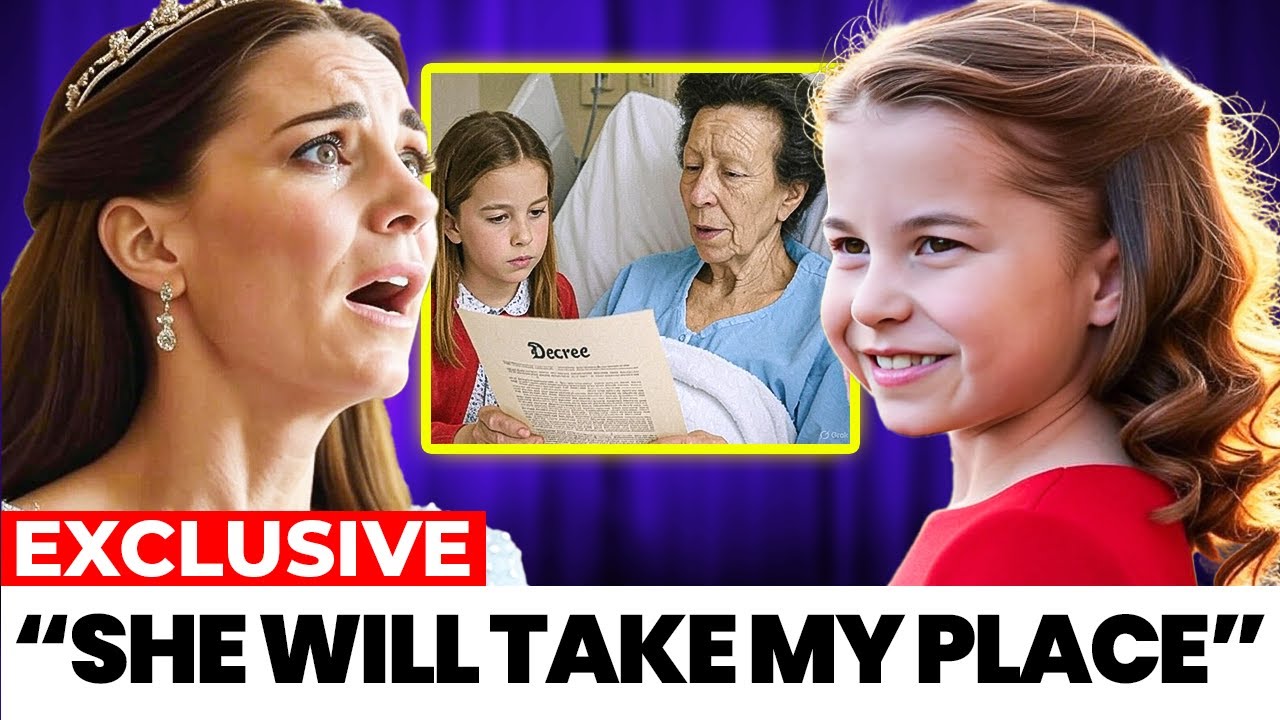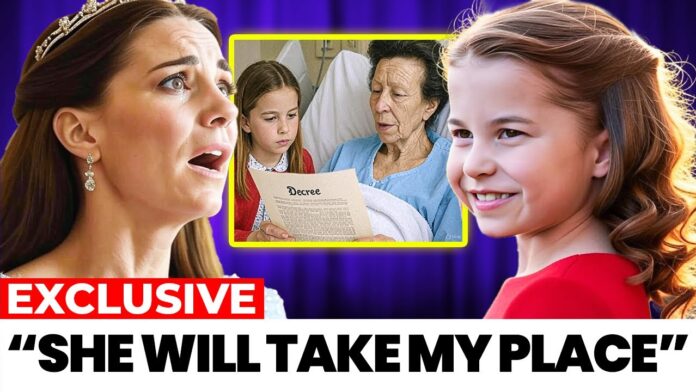😢 Princess Anne’s Heartbreaking Dementia Reveal Shocks Royals! 😢
Battling memory loss, Princess Anne stuns the world by naming young Princess Charlotte her successor—what’s behind this emotional decision? 🏰💔 The monarchy’s future hangs in the balance… Uncover the touching story everyone’s talking about!

Introduction: A Royal Announcement That Shook the World
In July 2025, Princess Anne, the Princess Royal, delivered a heart-wrenching announcement that reverberated across the globe. At 75, the steadfast sister of King Charles III revealed her battle with dementia in a rare public address, marking a vulnerable moment in her life of unwavering duty. Even more surprising was her declaration naming her great-niece, Princess Charlotte, as her “successor” in spirit, entrusting her with symbolic responsibilities tied to Anne’s legacy. This emotional revelation, shared via a video message from her Gatcombe Park estate, has sparked widespread empathy and speculation about the future of the British monarchy. As the royal family grapples with multiple health crises, Anne’s openness underscores themes of resilience, family bonds, and the evolving role of women in the monarchy.
Princess Anne’s Health Journey: From Concussion to Dementia
Princess Anne’s health came under scrutiny in June 2024 after a serious horse-related accident at her Gatcombe Park home. Then 73, she suffered a concussion and minor head injuries, spending five days in a Bristol hospital. The incident, believed to involve a kick from a horse, caused temporary memory loss, with Anne later admitting she had no recollection of it. By early 2025, concerns about cognitive decline surfaced as she spoke publicly about persistent memory gaps. Her July 2025 announcement confirmed a dementia diagnosis, a progressive condition affecting memory, thinking, and daily functions.
Dementia, encompassing disorders like Alzheimer’s, impacts over 900,000 people in the UK, with symptoms including confusion, difficulty with names, and loss of independence. Anne’s case may be linked to her concussion or age-related factors, as head injuries are a known risk factor. Known for her robust health and over 400 annual engagements, Anne has embodied stoicism throughout her life. Her equestrian pursuits, including competing in the 1976 Olympics, exposed her to risks, but this diagnosis marks a profound shift. In her announcement, she spoke candidly: “I’ve always prided myself on my memory, but now it’s fading. It’s a battle I must face, but I won’t do it alone.” This transparency mirrors King Charles’ openness about his own health struggles, signaling a modern monarchy willing to embrace vulnerability.
The Announcement: A Moment of Emotion and Legacy
Filmed at her Gloucestershire home, Anne’s July 2025 broadcast was a poignant blend of strength and fragility. Dressed simply in a blouse and cardigan, she addressed the nation with her characteristic directness, detailing her symptoms—forgetfulness during conversations, struggles with names—and her decision to step back from select duties. The bombshell came when she named Princess Charlotte, the 10-year-old daughter of Prince William and Catherine, as her “successor.”
The Princess Royal title is not hereditary; it’s a lifetime honor bestowed by the sovereign, often on the eldest daughter. Anne received it in 1987 from Queen Elizabeth II. She cannot formally name a successor—the King decides—but her statement was symbolic, expressing a wish for Charlotte to inherit her ethos of service, equestrian passion, and advocacy for women. “Charlotte has the spirit, the curiosity, and the strength. I see myself in her,” Anne said, her voice breaking with emotion. This nod to Charlotte, third in line to the throne, underscores generational continuity in a family strained by health challenges.
Why Princess Charlotte? A Symbolic Succession
Charlotte’s selection is deeply personal. At 10, she has shown poise at public events like Trooping the Colour and shares Anne’s love for horses. Her middle name, Elizabeth, honors her great-grandmother, but her bond with Anne—seen in shared family moments—runs deep. Anne, childless in terms of direct heirs for her title, views Charlotte as a fitting mentee.
This “succession” is about legacy, not law. The Princess Royal title could pass to Charlotte upon Anne’s passing or abdication, if King Charles or William, as future king, agrees. Historically, the title has skipped generations; Queen Mary was the last before Anne. Charlotte’s potential as the first Princess Royal of her generation aligns with the monarchy’s push for female empowerment, echoing Anne’s trailblazing as the first royal woman in the Olympics. Critics argue Anne’s announcement oversteps, as titles are the monarch’s prerogative, with some dismissing it as symbolic overreach. Supporters, however, see it as a heartfelt gesture, humanizing the royals and inspiring hope.
The Broader Royal Health Crisis
Anne’s diagnosis compounds the monarchy’s health challenges. King Charles’ 2024 cancer battle, Catherine’s recovery from cancer in 2025, and Sarah Ferguson’s melanoma have tested the “slimmed-down” institution. As the hardest-working royal, with 457 engagements in 2023, Anne’s step back creates a significant void. Her involvement in over 300 charities, including Save the Children and the British Olympic Association, must now transition to others.
Dementia in the spotlight could boost awareness. Anne’s patronage of dementia-related causes, like her July 2025 visit to a care facility where she engaged with sensory tools for patients, takes on new meaning. Her announcement may encourage early diagnosis, as head injuries like hers increase dementia risk by up to 50%. By sharing her story, she’s poised to drive funding and support for dementia research, much like Charles did for cancer.
Family Dynamics: Support and Strain
The royal family has rallied around Anne. King Charles, her brother, praised her “courage and grace.” William and Catherine, Charlotte’s parents, expressed pride in their daughter’s mention, with Catherine’s own health journey fostering empathy. Charlotte, aware of her great-aunt’s condition, reportedly sent handmade cards, highlighting the family’s intergenerational bonds.
Yet, strains exist. Anne’s no-nonsense style contrasts with the younger generation’s approach. Her 2024 accident and memory issues likely accelerated discussions about succession, especially with Charles’ health fragile. Prince Harry’s absence, amid ongoing rifts, leaves the support network thinner, placing more pressure on William and Catherine to fill the gap.
Public Reaction and Global Impact
Anne’s announcement sparked an outpouring of support. Social media platforms like X buzzed with hashtags like #PrincessAnneStrong, with posts praising her bravery: “Princess Anne’s dementia reveal is heartbreaking, but her naming Charlotte successor is inspiring.” Viral videos on TikTok dissected the emotional broadcast, amassing millions of views. Global leaders, including U.S. President Joe Biden, sent well-wishes, noting Anne’s diplomatic contributions.
Skeptics questioned the timing, suggesting it diverts attention from other royal issues. Some dismissed the succession claim as exaggerated, but the Palace’s confirmation of Anne’s diagnosis quelled doubts. The public’s empathy reflects Anne’s reputation as the “people’s princess” in her own right, known for her tireless work and relatability.
Implications for the Monarchy’s Future
Anne’s battle signals a shift toward transparency, destigmatizing dementia and encouraging public dialogue about chronic illness. It may prompt reforms in royal health protocols, emphasizing mental wellness alongside physical health. For Charlotte, this symbolic “anointment” prepares her for future roles, potentially as Princess Royal, blending tradition with modernity.
The monarchy, post-Elizabeth II, faces a precarious future. Anne’s reduced duties add pressure on William and Catherine, but Charlotte’s involvement hints at a vibrant next generation. As Anne herself noted, “The crown endures through family.” Her announcement ensures her legacy lives on, even as her memory fades.
Challenges Ahead: Living with Dementia
Anne’s journey forward involves managing symptoms through therapy, music (a known aid for dementia), and family support. Her equestrian estate may require safety adaptations to accommodate her condition. Her continued engagement with charities, even in a limited capacity, could inspire others facing similar diagnoses. Organizations like Alzheimer’s Society have already praised her for raising awareness, predicting a surge in public support.
Conclusion: A Legacy of Strength and Succession
Princess Anne’s 2025 dementia announcement and symbolic succession to Princess Charlotte encapsulate a story of duty, vulnerability, and hope. At 75, her battle humanizes the monarchy, while elevating Charlotte signals a renewal of its spirit. As the royal family navigates this emotional chapter, Anne’s words resonate: “Memory may fade, but legacy endures.” In August 2025, this saga reminds us of the human heart behind the crown, and the promise of a young princess poised to carry it forward.
